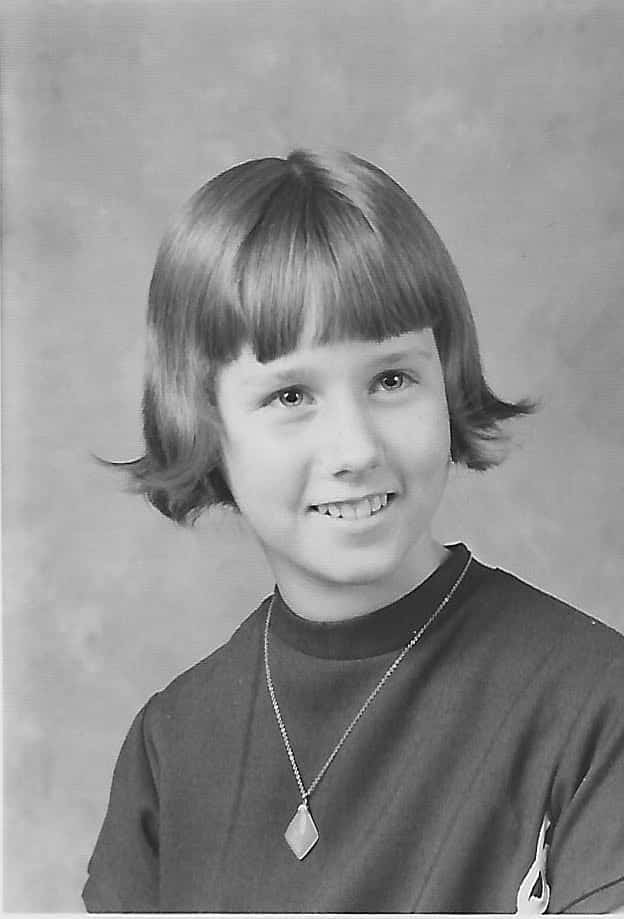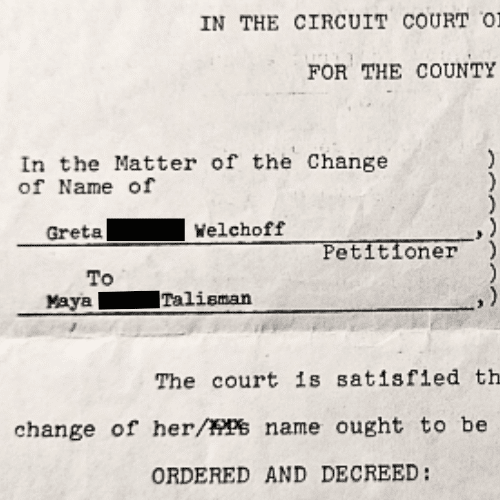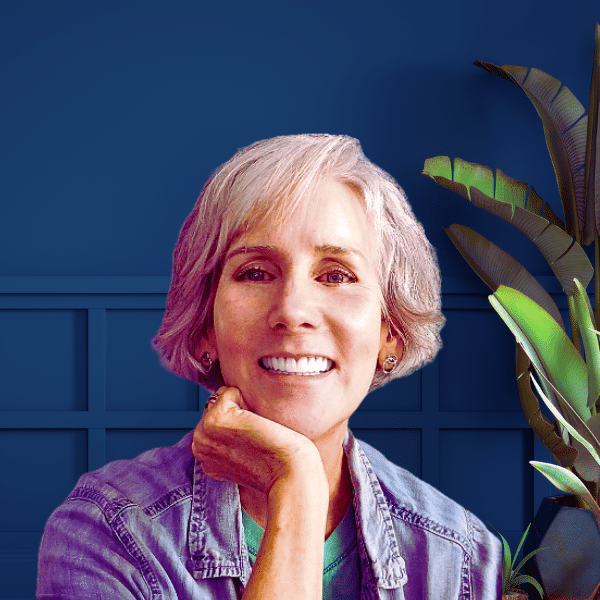Contents
Hello! Who are you?
Hi there! My name is Maya Frost. I grew up in Oregon (U.S.A.) but have lived in several countries since then. I have had many roles, from business owner and mindfulness trainer to educator in four countries. I currently work as a trauma-informed breakthrough coach for women over 50.
My husband and I are based in Buenos Aires, Argentina, just a block away from our youngest daughter and 4-year-old grandson.
Our other three daughters live in Amsterdam, Dubai, and Sacramento. This makes logistics challenging, especially with 5 grandchildren under 5! But we get together every year for a month, and our daily WhatsApp chats and calls keep us feeling connected.
I definitely consider myself to be a happy person! And I see myself as incredibly lucky.
However, I had a challenging childhood, and struggled with depression through my early adult years. I came close to ending my life multiple times.
💡 By the way: Do you find it hard to be happy and in control of your life? It may not be your fault. To help you feel better, we’ve condensed the information of 100’s of articles into a 10-step mental health cheat sheet to help you be more in control. 👇
What is your struggle and when did it start?
The first 15 years of my life were filled with challenges.These days, it would be called complex childhood trauma.I was adopted at birth by a couple who had been waiting for seven years to adopt.
By the time they got the call, they were eight months pregnant with their first child. They decided to adopt me anyway. Three years after my brother was born, they had another son. But their marriage was failing.
When my father told my mother that he was homosexual, she had to look it up in the dictionary! Since they were both Mormon, he was promptly excommunicated from the church and cut off from his family.
My mother moved with the three of us to her parents´ home in Oregon. Adding four people to a two-bedroom home was tough. My grandfather took on extra hours at his job managing a parking garage.Six months after we moved in, he died of a heart attack while mowing the lawn.
My grandmother became our main caregiver, while my mother took a job at a nearby manufacturing plant. The shock had hit my grandmother hard, and she suffered from early-onset dementia. In her confusion, she believed that I, as an outsider, had brought bad luck to the family. She attempted to kill me – twice.
Meanwhile, my father had attempted to kidnap my two brothers and me, resulting in a ban on visitation for five years. My mother remarried to a divorced man with four children. Our combined family worked to build a garage on a piece of rural property down a gravel road from a town of 365 people.

The sexual abuse began immediately. I had just turned 10.
I kept my head down, worked in the fields, saved my money, and plotted my escape.

Then, at 15, I was the sole survivor in a devastating car accident.
The driver and other three passengers – all under 18 – were killed on impact.
I was ejected and uninjured.
Since this accident occurred while I was visiting a friend in a city 30 miles away, and the others attended a school far from mine, both the police and my parents insisted that it would be best if I never mentioned the accident to anyone..
I know they were trying to protect me. And at the time, there was little understanding of the impact of such a traumatic event. No one suggested counseling.
So, I did what they asked. I did not tell a single person – not even my siblings – for years.
How did this struggle make you feel at your worst moments?
Reeling from survivor guilt (without knowing what that was), I engaged in self sabotage.I developed an eating disorder. I began to drink alcohol and use drugs to numb the pain.
But I looked like a successful student (I got all As), was active in my school, and had plenty of friends.
I hid my suffering well. Still, someone noticed that I was struggling. They offered to teach me to meditate.
I was touched by their offer, and tried my best. But it was hard for me to meditate with so many intense emotions and thoughts of suicide.
👉 Share your story: Help thousands of people around the world by sharing your own story. We would love to publish your interview and have a positive impact on the world together. Learn more here.
Was there a moment when you started to turn things around?
I had an idea. Instead of sitting and meditating, I would turn this focused attention (now commonly called mindfulness) into a game.
I picked out various cues all around me, deciding to use them as reminders to focus on that moment. Petting my cat. Hearing a particular birdsong. Touching a certain doorknob.
Each time I caught myself noticing my cue, I would say to myself, “I noticed. I am aware. I am calm”. And I would take a deep breath.
I added more cues. Pretty soon, I had so many that I couldn´t go even ten minutes without popping into mindfulness mode! I loved this game.It made me feel calm, clear, and creative. I got good at it. And it SAVED ME.
What steps did you take to overcome your struggle?
Years passed. Thanks to scholarships, loans, and a fat work/study package, I went to college.
I even studied abroad my senior year in nine Asian countries.

But, unable to find a job after graduation (it was in the middle of a recession), I began to suffer from depression again. For months, I sent out resumes and applications daily. I didn´t get a single interview.
I was stuck at home, which triggered my worst memories.I believed that all my achievements were useless. I began to doubt my ability to rise above my past. Despite my recent success, I felt destined to be UNLUCKY.
But I had an idea. What I needed was a fresh start! So, at 22, I legally changed my full name. I went from Greta Welchoff to Maya Talisman.

My friends and family ridiculed me. My adoptive father even “disowned” me for giving up his family name. I did not care. I had chosen TALISMAN as my last name. And I was convinced it would bring me good luck. Every time I said it, wrote it, or saw it, I said to myself, “I am lucky. Good things happen to me.”
I chanted it to myself. I imagined only positive things coming my way. Within DAYS, I was offered a job: teaching English in Japan! I was thrilled, despite my parents´ misgivings. Within two months of arriving in Japan, I met my soulmate. He was a fellow teacher who had grown up just ten miles from my hometown.

Within two years, we got married and had our first two daughters in Japan.
After moving back to Oregon, to a city between our two hometowns, we had two more daughters. We were happy and successful.
I was living a charmed life, just like I had expected. When my daughters were in middle and high school, I was reminded of my own experiences at their age, including the accident and its aftermath.
Also, I was struggling to process the deaths of three of my brothers (one to AIDS, two by suicide).
I felt that old darkness coming in.
So, I doubled down on my mindfulness practice. And I remembered my little game.
I thought it might help others the way it had helped me.
So, despite my complete lack of tech skills (this was 2003) and a topic (mindfulness) that was barely searched for on this thing called Google, I created a simple email course.
Three months later, meditation made the cover of TIME magazine.
Mindfulness was mentioned.
It became a buzzword.
Through that course and my newsletter, I was able to teach thousands of people in over 100 countries how to get calm, clear, and creative by playing my mindfulness game.
My eyes-wide-open approach to everyday awareness was featured in over 150 print and web outlets around the world.
Have you shared any of this with people around you in real life?
I never mentioned the accident to anyone until I met my future husband at 22.
He was sympathetic and supportive, and helped me understand the enormity of what I had been through.
I still have not talked to my siblings about it. It was easy to avoid telling them anything, because they did not believe me when I told them about the abuse that was happening to me. So, I gave up on getting any kind of support or understanding from them.
I was very close to my mother, but also felt extremely protective of her. I never even told her about her mother trying to kill me (once with a dishtowel around my neck, once in the bathtub)!
After my grandfather died, my mother was grieving and utterly exhausted. She sobbed in her bed each night after working the swing shift.
So, when she fell in love with my stepfather, I was so grateful and relieved! She was happier than I had ever seen her.I didn´t want to do anything to diminish that. So, I did not discuss my abuse, accident, depression, or anything heavy.
We talked constantly, but not about these things. Nor did I discuss any of this with my best friends in high school or college.They did not have lives like mine. I did not expect them to understand.
I got used to keeping it to myself. Though it certainly impacted me in many ways, I didn´t see it as a burden. Instead, I focused on being proud of myself for my strength in handling it on my own.
I viewed everything as a catalyst for my creativity. I had come up with creative ways (my game and changing my name) to help myself! When I changed my name, it felt like a declaration of independence from my family. And they saw it that way, too.
Between changing my name and moving abroad, I managed to create that fresh start I longed for. It was the best gift I have ever given myself.
It wasn´t until much later in life, my 50s really, that I began to share my full story openly. It did not feel cathartic, because I had already healed myself. But I did find that others were interested, asked questions, and wanted to learn from me. This is what ultimately led me to become a trauma-informed coach for women over 50. I feel so fortunate to have this ability to understand them and this opportunity to help them.
If you could give a single piece of advice to someone else that struggles, what would that be?
Make your own luck.
If you cannot trust those around you to give you the support you need, use this as motivation to give yourself that support. Begin seeing yourself as strong and lucky. Do whatever you need to do to change your mindset.
But you don´t have to change your name to start feeling lucky! Start actively looking for the positive in even the worst situations. Once you believe you’re lucky, you expect success.
So, you try bold things! I would not have applied for that job in Japan if I hadn’t decided to feel lucky first. And suddenly, I was lucky! That reinforced my belief, and kept me moving forward. For me, shifting to the idea of being lucky was easier (and more fun) than focusing on actions, because I already felt I was doing everything possible to get a job, at least within my area.
Choosing to feel lucky is a bit like my mindfulness game. It gives your brain a dopamine hit when you notice something small, like finding a quarter on the sidewalk or getting a perfect parking spot.
Once you start noticing those lucky occurrences, it reinforces your belief in positive things happening to you, and the dopamine keeps coming! This can have an incredible cumulative impact. And, just as it did for me, it might even save your life.
What have been the most influential books, podcasts, YouTube channels, or other resources for you?
This book, which came out in the 70s, was the first book I read about mindfulness. I found it in the library, and devoured it. Just the title alone is a beautifully simple reminder to stay present!
This book gave me such a sense of validation for the mindfulness game I created twenty years earlier, because it focused on how everyday activities, like washing the dishes, can be opportunities for greater awareness.
This validation inspired me a few years later to create my course and newsletter!
I turned to this book after each of my three brothers died. It offers solace for those who are struggling with grief or loss of any kind.
Though this is a book adored by artists, with a lovely approach to expanding your own creativity, it is also about mindfulness.
Writing Morning Pages is a wonderful activity for anyone looking to tap into their own creative power.
Book The Body Keeps the Score: Brain, Mind, and Body in the Healing of Trauma by Bessel van der Kolk M.D.
This book gave me a deeper understanding of the ways in which trauma impacts the nervous system. It inspired me to become trained as a trauma-informed coach.
Of course, the best training of all was healing my own mental, emotional, and physical trauma through mindfulness and somatic therapy.
We can work for years on our mindset, but until we release the effects of trauma from our bodies, we will continue to revert to our old beliefs and behaviors. This has become an integral part of my work with clients.
Where can we go to learn more about you?
You can learn more about me and my work as a trauma-informed breakthrough coach for creative women over 50 on my website at MayaFrost.com
Feel free to sign up for my weekly newsletter or my secret podcast
I post regularly about creativity, breakthroughs, positive aging, and more over on LinkedIn
You can also follow me on Instagram and Pinterest.
💡 By the way: If you want to start feeling better and more productive, I’ve condensed the information of 100’s of our articles into a 10-step mental health cheat sheet here. 👇
This Cheat Sheet Will Help You Be Happier and More Productive
Thrive under stress and crush your goals with these 10 unique tips for your mental health.
Want more interviews?
Continue reading our inspiring case studies and learn how to overcome mental health struggles in a positive way!
Want to help others with your story? We would love to publish your interview and have a positive impact on the world together. Learn more here.




This is so powerful, mom. Thank you for sharing <3